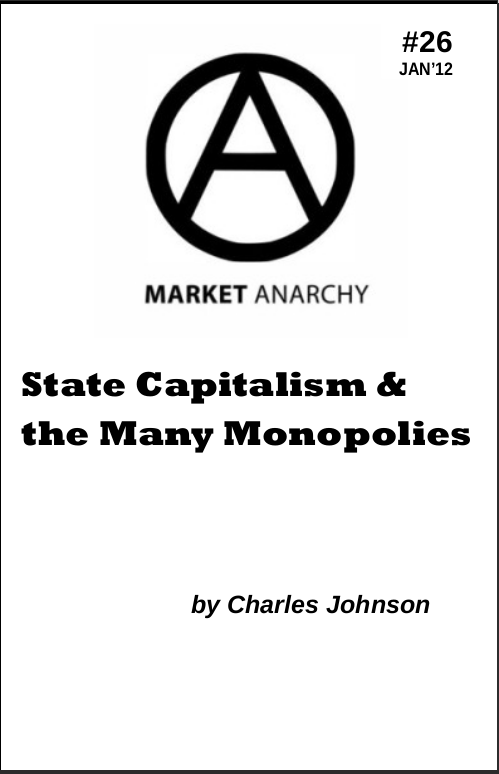C4SS has teamed up with the Distro of the Libertarian Left. The Distro produces and distribute zines and booklets on anarchism, market anarchist theory, counter-economics, and other movements for liberation. For every copy of Charles Johnson’s “State Capitalism and the Many Monopolies” that you purchase through the Distro, C4SS will receive a percentage. Support C4SS with Charles Johnson’s “State Capitalism and the Many Monopolies“.
$1.00 for the first copy. $0.75 for every additional copy.
In this essay, the individualist Anarchist writer Charles Johnson offers an analysis of the concrete mechanisms of capitalism, and of how the revolutionary potential of free economic relationships is diverted and deformed when markets are constrained to labor under bosses, monopoly and government. Johnson revisits, and updates, Benjamin Tucker’s classic “Four Monopolies” analysis of state capitalism, arguing that the case for Tucker’s free-market anticapitalism is stronger than ever, as we take into account not only the growth and retrenchment of the Land Monopoly, Money Monopoly, Patent Monopoly, and Protectionist Monopoly, but also the metastatic spread of state-capitalist monopolies into Agribusiness, Infrastructure, Utilities, Health Care, and Regulatory Protectionism.
For most of the twentieth century, American libertarians saw themselves, and were seen as, defenders of “capitalism.” Until nearly the end of the 20th century, anticapitalist anarchism was sidelined in political debate, and most simply ceased to be treat it as a live option; meanwhile, most American libertarians, and nearly all of their opponents, seemed to agree that opposing state control of the economy meant defending business against the attacks of “big government.” The purpose and effect of laissez faire was simply to unleash existing forms of commerce from political restraints, and to produce something which would look, more or less, like business as usual, only more so: bigger, faster, stronger, and no longer held back by government from pushing the corporate business model to the hilt.
This was almost a complete reversal from the attitude of traditional libertarians like Benjamin Tucker, an attitude which we might call ‘free-market anti-capitalism.’ Tucker was one of the best-known defenders of free markets in nineteenth-century America. . . Yet he repeatedly described his views as a form of “Anarchistic Socialism.” . . . What could “socialism” mean for a radical, free-market individualist like Tucker? Certainly not government control of industry. Rather, what Tucker was pointing out was his opposition to actually-existing capitalist business practices, and his support for workers’ control over the conditions of their own labor – the control denied by the Four Monopolies and the artificial inequalities of wealth and bargaining power they fostered. For Tucker, then, a libertarian politics meant an attack on economic privilege – by removing the political privileges that propped it up, and dismantling monopolies by exposing them to competition from below. . . .








